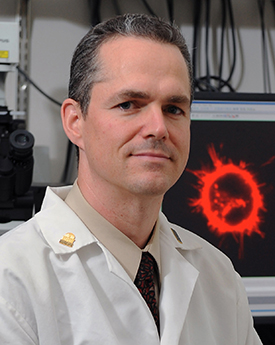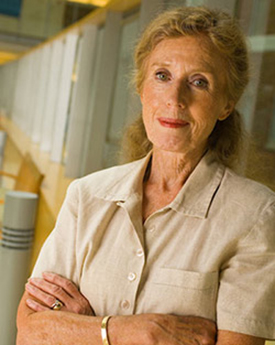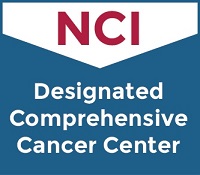Stuart S. Martin Awarded New Endowed Professorship Honoring Internationally Renowned Breast Cancer Researcher Angela H. Brodie, PhD
Contact:
Karen Warmkessel:
Watch the ceremony in the above video.
Martin Also Co-Leads Hormone-Related Cancers Program at University of Maryland Marlene and Stewart Greenebaum Comprehensive Cancer Center
University of Maryland School of Medicine (UMSOM) Dean E. Albert Reece, MD, PhD, MBA, announced today that Stuart S. Martin, PhD, Professor of Pharmacology and Physiology at UMSOM and a nationally recognized breast cancer researcher, has been installed as the inaugural Drs. Angela and Harry Brodie Professor in Translational Cancer Research.
The endowed professorship honors the late Angela H. Brodie, PhD, who, with her husband and longtime scientific collaborator, Harry Brodie, PhD, pioneered the development of aromatase inhibitors, a class of hormone-targeting drugs that has changed the face of breast cancer treatment.

Stuart S. Martin, PhD
Dr. Martin is recognized for groundbreaking research that combines bioengineering and tumor cell biology. He was the first to identify novel molecular targets called "microtentacles" on the surface of circulating tumor cells that may hold the key to preventing cancer metastasis.
"There is no one more fitting than Dr. Martin to carry on Dr. Angela and Dr. Harry Brodie's enduring legacy of scientific discovery and achievement in breast cancer research," Dean Reece said. "His discovery of microtentacles on the surface of breast cancer cells and continuing efforts to explore their role in how cancer spreads could lead to lifesaving new treatments to halt the progression of often-deadly cancers."
"Dr. Stuart Martin is a phenomenally talented scientist who has already made significant contributions to the field of breast cancer research," said Kevin J. Cullen, MD, the Marlene and Stewart Greenebaum Distinguished Professor of Oncology at UMSOM, and director of the University of Maryland Marlene and Stewart Greenebaum Comprehensive Cancer Center (UMGCCC). "He is an excellent choice to carry on the Brodies' legacy of translational research – moving discoveries made in the laboratory into clinical practice for the benefit of patients."
Dr. Cullen noted the tremendous impact that Drs. Angela and Harry Brodie's scientific partnership and subsequent development of aromatase inhibitors has had on the treatment of breast cancer. "Today, aromatase inhibitors are used worldwide by hundreds of thousands of women per year, saving countless lives," he said.
Dr. Martin's investiture was held on August 27. Among those who took part in the virtual ceremony was Dr. Harry Brodie, who said the creation of the new professorship "fills my heart with gratitude."

Angela H. Brodie, PhD
A British-born scientist, Dr. Angela Brodie was a Professor of Pharmacology at UMSOM for more 35 years until her retirement as Professor Emeritus in 2016. She died the following year. During the 1970s, she collaborated with her husband, Harry, a chemist who synthesized an early aromatase inhibitor, 4-hydroxyandrostenedione (4-OH-A), which was later marketed as Formestane. She carried on the research after coming to UMSOM in 1979.
"Dr. Martin's work represents the best of modern science and the embodiment of the approach Dr. Brodie used to develop aromatase inhibitors, starting from groundbreaking basic science done on cells in a dish and taking it all the way to a potentially transformational personalized medicine approach for treating breast cancers," said Scott Thompson, PhD, Professor and Chair, Department of Physiology at UMSOM.
Margaret M. McCarthy, PhD, the James and Carolyn Frenkil Dean's Professor and Chair of the Department of Pharmacology at UMSOM, added: "Dr. Martin's research on the role of microtentacles in cancer metastasis holds tremendous promise for preventing the devastating cancer recurrences experienced by so many breast cancer survivors. His innovative talents serve as a perfect complement to the powerful legacy of Harry and Angela in their advancement of lifesaving therapeutics. He is most deserving of this recognition."
The endowed professorship in the Department of Pharmacology was funded by the Greenebaum Family Foundation. Speaking on behalf of his family at Dr. Martin's investiture, Michael Greenebaum said that his late mother, Marlene, was treated with an aromatase inhibitor after her breast cancer recurred. "The development of the aromatase inhibitor by the Brodies really is what kept my mom alive for many years," Greenebaum said. He said he views Dr. Martin's new professorship as "passing research from one generation to the next. I can only imagine the breakthroughs and advances that will come about from the research that Dr. Martin is doing."
Konstantinos Konstantopoulos, PhD, Professor of Chemical and Biomolecular Engineering at the Johns Hopkins University, said of his longtime collaborator, "Stuart is, by any quantitative, or qualitative measure, a truly exceptional scientist. He's very well-established and extremely well-respected in the field of cancer research." He said Dr. Martin has published more than 75 articles in high-caliber scientific journals. "His work has been the torchlight for thousands of publications generated by others in the field."
In addition to his UMSOM appointment, Dr. Martin is the co-leader of the Hormone-Related Cancers Program at UMGCCC, one of 51 National Cancer Institute (NCI)-designated comprehensive cancer centers in the nation.
Dr. Martin received his PhD in biomedical sciences from the University of California, San Diego, after training as a Howard Hughes undergraduate research fellow at the University of Virginia. He completed a Damon Runyon postdoctoral fellowship at Harvard Medical School that combined functional genomic studies with mouse models of breast tumor metastasis, under the mentorship of Dr. Phil Leder. In 2004, Dr. Martin established his laboratory at UMSOM.
In 2010, Dr. Martin was one of only three investigators in the United States recognized with a five-year, $3.5 million Era of Hope Scholar Award from the Department of Defense for his innovative work on breast cancer metastasis. The award is given to exceptionally talented scientists who are considered the "best and the brightest" and have shown high potential for innovation in breast cancer research early in their careers.
Research in Dr. Martin's laboratory is currently supported by two R01 grants from the National Cancer Institute, a VA Merit Award and funding from the METAvivor Foundation, American Cancer Society, Kahlert Foundation, and Maryland Cigarette Restitution Fund Program.
About the University of Maryland School of Medicine
Now in its third century, the University of Maryland School of Medicine was chartered in 1807 as the first public medical school in the United States. It continues today as one of the fastest growing, top-tier biomedical research enterprises in the world -- with 45 academic departments, centers, institutes, and programs; and a faculty of more than 3,000 physicians, scientists, and allied health professionals, including members of the National Academy of Medicine and the National Academy of Sciences, and a distinguished two-time winner of the Albert E. Lasker Award in Medical Research. With an operating budget of more than $1.2 billion, the School of Medicine works closely in partnership with the University of Maryland Medical Center and Medical System to provide research-intensive, academic and clinically based care for nearly 2 million patients each year. The School of Medicine has more than $540 million in extramural funding, with most of its academic departments highly ranked among all medical schools in the nation in research funding. As one of the seven professional schools that make up the University of Maryland, Baltimore campus, the School of Medicine has a total population of nearly 9,000 faculty and staff, including 2,500 student trainees, residents, and fellows. The combined School of Medicine and Medical System ("University of Maryland Medicine") has an annual budget of nearly $6 billion and an economic impact more than $15 billion on the state and local community. The School of Medicine faculty, which ranks as the 8th highest among public medical schools in research productivity, is an innovator in translational medicine, with 600 active patents and 24 start-up companies. The School of Medicine works locally, nationally, and globally, with research and treatment facilities in 36 countries around the world. Visit medschool.umaryland.edu
About the University of Maryland Marlene and Stewart Greenebaum Comprehensive Cancer Center
The University of Maryland Marlene and Stewart Greenebaum Comprehensive Cancer Center (UMGCCC) is a National Cancer Institute-designated Comprehensive Cancer Center in Baltimore. The center is a joint entity of the University of Maryland Medical Center and University of Maryland School of Medicine. It offers a multidisciplinary approach to treating all types of cancer and has an active cancer research program. It is ranked among the top cancer programs in the nation by U.S. News & World Report. www.umgccc.org.


